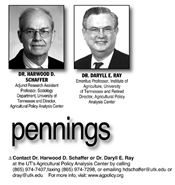|
The Long Journey Toward Understanding The Role Of Nutrition In Human Health

With the USDA well into the preparation of the 2020-2025 Dietary Guidelines (https://tinyurl.com/wpbqxvh), we were intrigued by the January 15, 2020 publication in JAMA’s (Journal of the American Medical Association) Medical News & Perspectives of an article titled, “Backlash over meat dietary recommendations raises questions about corporate ties to nutrition scientists” that discussed a squabble that broke out over the publication of a paper in the Annals of Internal Medicine (https://tinyurl.com/qmr3tle). The question was whether or not ties between researchers and the meat industry influenced the pending paper’s conclusion that with regard to eating red meat “adults needn’t change their meat-eating habits.”
We make this point because we expect that the release of the USDA’s 2020 Dietary Guidelines will be greeted by the same level of controversy with regard to a number of its recommendations, whatever they may turn out to be.
At this point we think that partisans on both sides of the battle need to step back and take a deep breath. We have seen changing recommendations concerning the eating of eggs and the role of fats in human diets, among others. We need to understand that dietary science is not physics and humans with a high degree of free-will are not planets. On the other hand, anyone who has looked at recent studies of black holes could easily come to the conclusion that physics is not physics either.
Human knowledge is in flux and we are learning new things at an unprecedented rate. In many ways, we do not even know what we don’t know. Now this may sound like philosophical rambling, but it has a point, especially with regard to nutrition.
One of the problems with nutrition science is that it is very difficult to conduct randomized clinical trials like we do for the medicines we take. The time-span for measuring the effectiveness of anti-psychotic drugs is much shorter than determining whether or not eating red meat has an impact on the longevity of human life. It is much easier to get people to participate in a double-blind trial of relatively short duration where they take pills that look alike, but one is a placebo and the other contains the drug under test.
First, when it comes to diets, the length of time the tests last needs to be much longer to determine the effects of eating red meat (or any other food item under test). What red eat eater wants to spend the 30 years that might be required for the study trial having to eat fake meat? Second, it is difficult to develop a placebo that looks and tastes like red meat. Third, it is difficult to get people who do not like red meat or have an ethical objection to eating it to participate in such a trial. The randomized clinical trials that are the back bone of much of science are difficult to implement in nutritional studies.
That leaves the field of nutrition with conducting observational studies over various periods of time where people report what they eat and the various illnesses they have. In this kind of study confounding variables abound, making it difficult to attribute cause and effect to eating one food product or another.
That being said, there are things we do know. We know that a minimum caloric intake is required for healthy human development. We know that certain vitamins and minerals are necessary for full human development and that getting them through the foods we eat rather than a pill is preferable, We know that having fiber in our diet is important and that in addition to fiber and calories we need at least a minimum level of protein in our diet.
This protein can come either from animal sources or from a combination of grains and pulses that can provide humans with the essential amino acids they need to synthesize the protein we need for full human development.
So, what does all of this mean?
For us this suggests that when the 2020 Dietary Guidelines come out, we all take a step back and take a deep breath and recognize that this is one step in a long journey in understanding the role of nutrition in human health and it’s the best that we know at this point in time.
As Christine Laine, MS, MPH, and Editor of Annals of Internal Medicine said: “The sad thing is that the important messages have been lost …. Trustworthy guidelines used to depend on who were the organizations or the people they came from.” Today, though, “the public should know we don’t have great information on diet,” Laine said. “We shouldn’t make people scared they’re going to have a heart attack or colon cancer if they eat red meat.” ∆
DR. HARWOOD D. SCHAFFER: Adjunct Research Assistant Professor, Sociology Department, University of Tennessee and Director, Agricultural Policy Analysis Center
DR. DARYLL E. RAY: Emeritus Professor, Institute of Agriculture, University of Tennessee and Retired Director, Agricultural Policy Analysis Center
|
|